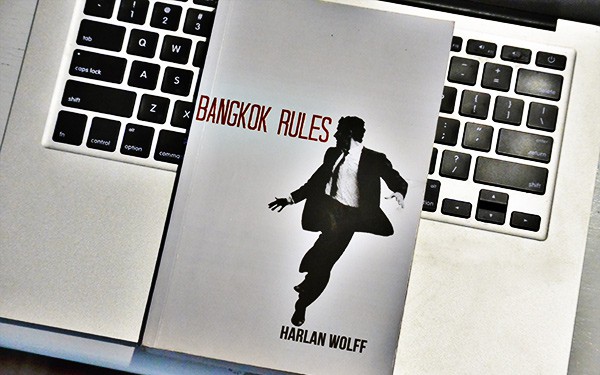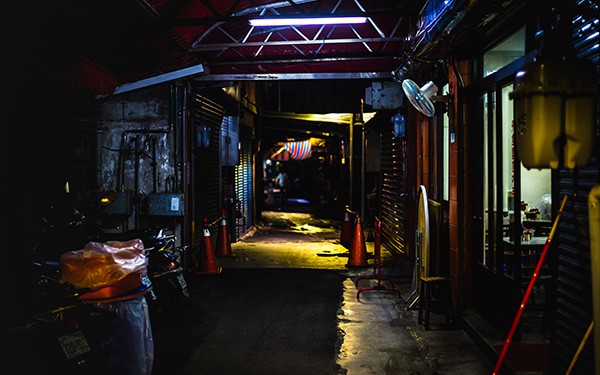Bangkok Rules is the first book by long-time Bangkok expat, Harlan Wolff.
Thrilling, macabre and fast-paced, it’s an enjoyable romp of a read and an entertaining glimpse below the surface of the expatriate life in our fine city.
On the trail of a serial killer, we follow private investigator Carl Engel as he uncovers clues, sweetens deals for his official informants and gets caught up in a world, it’s hinted at many times, that’s too murky for most to stomach.
This is the dark side of Bangkok that’s long been immortalised in the Bangkok noir genre. A world of ex-CIA agents, men about town, beautiful — if almost anonymous — women and, of course, bloody murder.
In Bangkok Rules, Engel’s serial killer is a particular flavour of psychopath that fits in well with the horror of the Bangkok night. A ritualistic one. A trait particularly well matched to a country so steeped in ritual itself. This murderer specialises in the murder of young, local women, bodily mutilation and keeping dismembered parts as trophies.
But while the murderer’s salacious deeds are the indisputable why of the book, Engel is very much the who — and it’s in creating his character that Wolff is at his strongest.
As a former private investigator himself, it probably wouldn’t be too libelous to suggest that Wolff drew at least partially on his own experience and humanity to create Engel. Regardless of any similarities between author and protagonist, he’s a very well drawn character indeed — a complex blend of aloof, vulnerable, clever and, unmistakably, old school.
This ‘old school’ nature means that Engel is almost instantly recognisable as a middle-aged Bangkok expat.
Seriously. You could transplant the character into a post-apocalyptic Canadian sci-fi novel and would probably still end up thinking, “I bet this bloke has spent some serious time in lower Sukhumvit.”
It’s all there: the disdain for traditional authority, the solo daytime visits to Soi Cowboy, the traces back to the Vietnam War, the hints at conspiracy theories and the memories of a chequered past.
The fact that these traits are so recognisable only makes the character more believable. The prologue begins with a disturbing quote from the infamous American serial killer Ted Bundy,
We serial killers are your sons, we are your husbands, and we are everywhere.
While that’s undoubtedly true of murderers, it could also be applied to private investigators in Bangkok — they walk among us…

Beautifully minimalist cover art
Engel’s antagonist is, of course, the serial killer. Just on the media coverage of the murders alone, Engel is able to ascertain that our Big Bad is a type IV killer — that is one that feels no remorse, and one that derives much pleasure and sexual gratification for his conquests.
Pretty evil dude.
We learn more about the killer through what Engel uncovers through his investigations, which if anything lends him even more danger in his obscurity, and the occasional flash to the killer’s own present reality at certain important stages. Engel meets with him twice, the later meet being the final showdown, and it’s interesting to see the interaction between two clever minds, one enjoying a place in society despite his sadism, the other looking to catch him as he himself balances on the fringes.
Cat and mouse.
And interestingly, although Engel is very much an ‘old-school’ character, Bangkok Rules is concluded in a surprisingly modern and futuristic way.
While Wolff’s drawing of Engel is excellent — and as are many of the supporting characters, most notably the loyal George — the one way I would have liked the author to have gone further is in the depiction of the female characters.
There are plenty of women in the novel but they are variously murder victims, angry, lovelorn and occasionally G-string clad waitresses, bitch wives, long-suffering maids, and, memorably, pink-nippled mistresses.
While there’s obviously no need to create detailed backstories for every supporting character, it would have been nice to have seen something of substance on the women who helped make Engel the complex man we meet in Bangkok Rules, namely a black woman from his near past who is introduced to us as — wait for it — ‘blackbird’.
From there follows a minor aside about the perils of political correctness.
I told you he was a familiar character.
But this is a small complaint against what is otherwise a great first book. And the likely audience — Bangkok expats perhaps resembling something of Engel themselves — are unlikely to be too deterred by that remark.
All in all, it’s a fun and easy read. There’s something so satisfying about reading stories set in somewhere you’re familiar with, and Bangkok Rules more than delivers on that front as we chart our hero around Sukhumvit and the city at large.
Highly recommended — you can buy Bangkok Rules on Amazon in print or Kindle format.
** Disclaimer: This site is part of the Amazon affiliate program. We earn commission for purchases made through our links. This does not affect the price you pay.**


